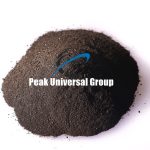
Gilsonite in Oil & Gas Well Cementing | Benefits & Uses
Gilsonite Usage in Oil & Gas well Cementing – Gilsonite, also known as natural bitumen or asphaltum, is a naturally occurring hydrocarbon resin found primarily in the Uintah Basin of northeastern Utah. This unique mineral is prized for its versatility and has found a wide range of applications across various industries, including oil and gas, where it plays a critical role in well cementing processes. Oil and gas well cementing is a crucial process in the drilling and completion of wells. Peak Universal Business: A Leading Supplier of Gilsonite.
It involves the placement of a cement sheath between the casing and the wellbore to provide structural support, isolate the wellbore from surrounding formations, and protect the casing from corrosion. The cement must possess specific properties to ensure the integrity and longevity of the well. This is where Gilsonite comes into play.
What is Gilsonite?
Gilsonite is a solid, black, glossy substance that is relatively lightweight compared to other types of bitumen. It is formed from the remains of ancient plant material that has been subjected to high pressure and temperature over millions of years. The resulting product is a pure form of natural bitumen that boasts a unique set of physical and chemical properties.
Gilsonite is distinct from other types of bitumen due to its purity, hardness, and solubility in organic solvents. It is non-toxic and has a high melting point, which makes it an ideal material for various industrial applications.
Benefits of Gilsonite Usage in Oil & Gas well Cementing
1.Enhanced Flexibility and Resilience
Gilsonite imparts flexibility to the cement, reducing the risk of cracking under stress. This is particularly important in wells subjected to high pressure and temperature variations.
2.Improved Bonding and Sealing
The addition of Gilsonite enhances the bonding properties of the cement, ensuring a more effective seal. This prevents the migration of fluids between different formations and maintains well integrity.
3.Reduced Fluid Loss:
Gilsonite acts as a natural plugging agent, reducing fluid loss during the cementing process. This helps in maintaining the desired cement slurry density and consistency.
4.Thermal Stability:
Due to its high melting point, Gilsonite improves the thermal stability of the cement, making it suitable for high-temperature applications.
5.Environmental Benefits:
Being a natural product, Gilsonite is environmentally friendly and does not introduce harmful chemicals into the wellbore.
Peak Universal Business: A Leading Supplier of Gilsonite
Peak Universal Business has established itself as a premier supplier of Gilsonite, catering to the specific needs of the oil and gas industry. With a commitment to quality and sustainability, Peak Universal Business ensures that their Gilsonite products meet the highest industry standards.
- Quality and Purity
Peak Universal Business sources its Gilsonite from the richest deposits, ensuring the highest quality and purity. Their stringent quality control processes guarantee that the Gilsonite is free from impurities and meets the required specifications for oil and gas well cementing.
- Custom Solutions
Understanding that each well has unique requirements, Peak Universal Business offers custom solutions tailored to the specific needs of their clients. Whether it’s adjusting the particle size or modifying the blend to achieve optimal performance, they work closely with their customers to provide the best possible product.
- Sustainability
Peak Universal Business is committed to sustainable practices in the extraction and processing of Gilsonite. They employ environmentally friendly methods and continuously seek to minimize their ecological footprint.
Why Use Gilsonite in Cementing?
Oil & gas well cementing requires additives that can:
-
Lower slurry density
-
Improve sealing of micro-fractures
-
Withstand high temperature and pressure
-
Minimize gas invasion and loss circulation
Gilsonite offers all these benefits due to its unique chemical and physical properties.
Typical Gilsonite Cement Blend Applications
| Application Area | Purpose | Mesh Size | Gilsonite Concentration |
|---|---|---|---|
| Shallow Gas Zones | Gas migration prevention | 40–100 mesh | 5–15% BWOC |
| Lost Circulation Zones | Sealing micro-fractures | 30–60 mesh | 5–10% BWOC |
| Lightweight Slurries | Reduce density without strength loss | 200 mesh | 10–20% BWOC |
BWOC = By Weight of Cement
Applications of Gilsonite Beyond Well Cementing
While the primary focus here is on the use of Gilsonite in oil and gas well cementing, it is worth noting that Gilsonite has a wide range of other applications, including:
- Asphalt and Road Construction: Gilsonite is used as an additive in asphalt mixes to improve durability, resistance to deformation, and water resistance.
- Ink and Paint: Due to its natural gloss and adhesive properties, Gilsonite is used in the production of inks and paints.
- Foundry Sands: Gilsonite acts as a binder in foundry sands, enhancing the quality of metal castings.
- Drilling Fluids: In the oil and gas industry, Gilsonite is also used in drilling fluids to stabilize shale formations and reduce torque and drag.
Detailed Analysis of Gilsonite in Well Cementing
1.Composition and Characteristics
Understanding the composition and characteristics of Gilsonite is crucial to appreciate its role in well cementing. Gilsonite typically contains:
- Hydrocarbons: The primary component, giving it its unique properties.
- Mineral Matter: Small amounts of inorganic materials that contribute to its structural integrity.
- Volatile Compounds: Low levels of volatile compounds that influence its melting point and solubility.
2.Mechanism of Action in Cement Slurries
When added to cement slurries, Gilsonite interacts with the cement particles and the surrounding formation in several ways:
- Particle Bridging: Gilsonite particles bridge the gaps in the cement matrix, enhancing the overall strength and flexibility.
- Filtration Control: By plugging the pores in the cement slurry, Gilsonite reduces fluid loss, maintaining the desired slurry properties.
- Stress Distribution: The flexible nature of Gilsonite helps distribute stress more evenly across the cement sheath, reducing the likelihood of fractures.
3.Case Studies and Field Applications
Numerous field studies and case applications have demonstrated the effectiveness of Gilsonite in well cementing. For instance, wells in high-temperature geothermal fields have benefited significantly from Gilsonite-enhanced cement, which has shown superior performance in maintaining well integrity under extreme conditions.
4.Challenges and Considerations
While Gilsonite offers many advantages, there are also challenges and considerations to keep in mind:
- Compatibility: Ensuring that Gilsonite is compatible with other additives and the specific cement formulation is crucial.
- Mixing and Handling: Proper mixing and handling techniques are required to achieve a uniform distribution of Gilsonite in the cement slurry.
- Cost: Although cost-effective in the long run, the initial cost of high-quality Gilsonite can be higher compared to other additives.
5.Future Prospects
The future of Gilsonite in oil and gas well cementing looks promising. Ongoing research and development efforts are focused on enhancing its properties and finding new applications. Advances in nanotechnology and material science may unlock new potentials for Gilsonite, further solidifying its role in the industry.
Frequently Asked Questions (FAQ)
Is Gilsonite compatible with all cement systems?
Yes, Gilsonite can be blended into Class A–H cement systems, and with other additives like retarders, dispersants, and latex.
Does Gilsonite affect compressive strength?
When used correctly, Gilsonite maintains adequate strength while reducing density. It may even improve toughness in some slurry designs.
What particle size is best for cementing?
30–200 mesh is common. Finer particles seal pores, while coarser particles plug micro-fractures. Blends of multiple sizes work best.
Can Gilsonite help with lost circulation?
Yes. Gilsonite acts as a bridging agent, sealing fractures and preventing cement slurry from escaping into the formation.
Conclusion- Gilsonite Usage in Oil & Gas well Cementing
Gilsonite Usage in Oil & Gas well Cementing – Gilsonite, with its unique properties and benefits, plays a vital role in enhancing the performance of cement used in oil and gas wells. Peak Universal Business stands out as a reliable supplier, offering high-quality, customized solutions to meet the demands of the industry. As technology advances and new challenges arise, Gilsonite is poised to remain a key component in well cementing, ensuring the safety, efficiency, and longevity of oil and gas wells.
By understanding and leveraging the benefits of Gilsonite, the oil and gas industry can continue to improve well integrity, reduce environmental impact, and achieve greater operational efficiency. With Peak Universal Business A Leading Supplier of Gilsonite, the future of well cementing looks brighter than ever.
You can Read More about Gilsonite Here: Discover how Gilsonite improves oil & gas well cementing by enhancing fluid loss control, reducing slurry density, and increasing zonal isolation in high-pressure wells.
-
Gilsonite in oil well cementing
-
Asphaltite cement additive
-
Gilsonite: Its Uses, Applications
-
Difference between Bitumen and Gilsonite
Need Technical Support or Supply?
Peak Universal Business: A Leading Supplier of Gilsonite.
We in Peak Universal Business, offer Gilsonite cementing grades in multiple mesh sizes with guaranteed ash content and solubility. Request a TDS, sample, or quote today. If You have any other Query or Question you want to ask, Please don’t hesitate to Contact Us. Peak Universal Business: A Leading Supplier of Gilsonite.
- 0 comment





Leave a Reply